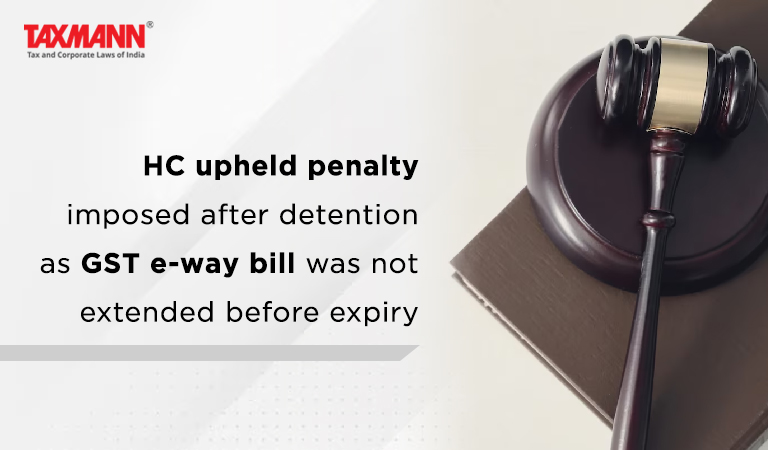HC upheld penalty imposed after detention as GST e-way bill was not extended before expiry
- Blog|News|GST & Customs|
- 2 Min Read
- By Taxmann
- |
- Last Updated on 1 March, 2023

Case Details: Ashok and Sons (HUF) v. Joint Commissioner, State Tax, Office of the Senior Joint Commissioner, Siliguri Circle - [2023] 147 taxmann.com 582 (Calcutta)
Judiciary and Counsel Details
-
- Bibek Chaudhuri, J.
- Jagriti Mishra, Subham Gupta, Debayan Goswami & Reshab Kumar, Advs. for the Petitioner.
- Subir Kumar Saha & Bikramaditya Ghosh, Advs. for the Respondent.
Facts of the Case
The petitioner was manufacturer/supplier of milestone Bitumen Emulsion and Allied products. In course of business, the petitioner supplied Bitumen Emulsion after generating proper E-Way bill dated 5th March, 2022 which was valid up to 9th March, 2022 from Begusarai to Guwahati.
The vehicle was intercepted and on inspection it was found that E-Way bill in respect of the consignment had expired. The penalty was levied and it preferred an appeal before the Appellate Authority which was dismissed. It filed writ petition against the penalty order.
The department submitted that the petitioner’s consignment was found lying within territory of originating State when e-way bill had expired.
High Court Held
The Honorable High Court noted that the driver gave statement that during the course of transportation, the good carriage suffered from breakdown. However, in support of his contention he failed to produce proper document. Moreover, the petitioner had the opportunity to extend the validity of the E-Way bill when the goods vehicle had mechanical defect. The petitioner did not take any step for extension of E-Way bill.
Therefore, it was held that the department has power to impose penalty under Section 129 as well as demand tax as goods were found to be detained in territory of State and the petition was dismissed.
Disclaimer: The content/information published on the website is only for general information of the user and shall not be construed as legal advice. While the Taxmann has exercised reasonable efforts to ensure the veracity of information/content published, Taxmann shall be under no liability in any manner whatsoever for incorrect information, if any.

Taxmann Publications has a dedicated in-house Research & Editorial Team. This team consists of a team of Chartered Accountants, Company Secretaries, and Lawyers. This team works under the guidance and supervision of editor-in-chief Mr Rakesh Bhargava.
The Research and Editorial Team is responsible for developing reliable and accurate content for the readers. The team follows the six-sigma approach to achieve the benchmark of zero error in its publications and research platforms. The team ensures that the following publication guidelines are thoroughly followed while developing the content:
- The statutory material is obtained only from the authorized and reliable sources
- All the latest developments in the judicial and legislative fields are covered
- Prepare the analytical write-ups on current, controversial, and important issues to help the readers to understand the concept and its implications
- Every content published by Taxmann is complete, accurate and lucid
- All evidence-based statements are supported with proper reference to Section, Circular No., Notification No. or citations
- The golden rules of grammar, style and consistency are thoroughly followed
- Font and size that’s easy to read and remain consistent across all imprint and digital publications are applied



 CA | CS | CMA
CA | CS | CMA
